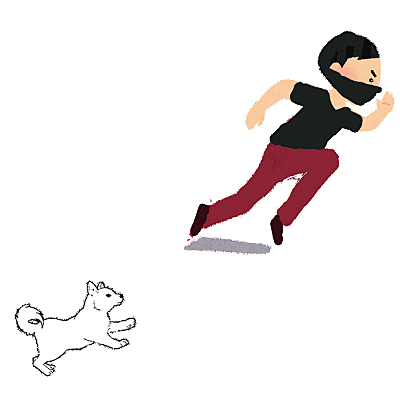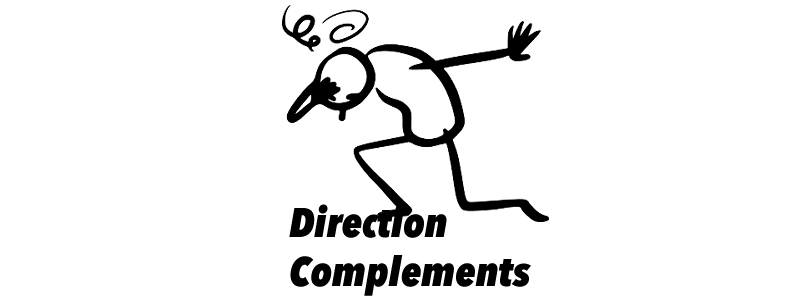This article focuses on the use of direction complements in figurative language, such as in English phrases like ‘clean up’, ‘calm down’, ‘figure out’, etc. If you’re unfamiliar with directional complements, I recommend reading the following links first.
📖 Basic Direction Complement
📖 Compound direction complements
V + 上 shàng or shang
上 shang has 7 common extension usages as a directional complement.
1. “Get closer to”

狗追上了小偷狗追上了小偷
The dog catches up with the thief.
小心跟上(我)小心跟上(我)
Follow me and be careful!
2. From open to close
閉上眼睛闭上眼睛
Close your eyes.
關上門关上门
Close the door.
闔上書阖上书
Close the book.
I know you are going to complain that why the simple word ‘close’ has three different Chinese characters, but English also has words like ‘to see,’ ‘to watch,’ ‘to read,’ and ‘to look,’ while Chinese uses only one character, which is 看 kàn. So stop complaining!
3. Make sth exist somewhere
寫上你的名字写上你的名字
Write down your name.
我在牆上掛上了小狗的照片我在墙上挂上了小狗的照片
I hung a picture of the puppy on the wall.
她打算在台北住上幾天她打算在台北住上几天
She plans to stay in Taipei for a few days.
4. Achieve a difficult goal
他終於當上醫師了他终于当上医师了
He finally become a doctor.
我考上耶魯大學了我考上耶鲁大学了
I got into Yale University.
你一定能申請上理想的工作你一定能申请上理想的工作
You will be able to apply to your ideal job.
5. “Up to; as many as”
你的收入比我的多上1000美金吧你的收入比我的多上1000美金吧
Your income is $1000 more than mine, right?
他比我高上4、5公分他比我高上4、5公分
He is 4 or 5 cm taller than me.
我的中文比你好上100倍我的中文比你好上100倍
My Chinese is one hundred times better than yours.
6. Wearing; put on
穿上衣服穿上衣服
Put on the clothes.
戴上項鍊戴上项链
Put on the necklace.
繫上領帶系上领带
Tie up the tie.
7. Add
算上我吧!算上我吧!
Count me in!
加上一點糖加上一点儿糖
Add some sugar.
V + 下 xià
The directional complement 下 xià has 3 common extension usages.
1. Capacity for holding or containing
這個袋子裝得下五本書嗎?这个袋子装得下五本书吗?
Can this bag hold five books?
你吃得下這全部的飯嗎?你吃得下这全部的饭吗?
Can you eat the whole meal?
我的心容不下你我的心容不下你
I’ve got no room for you.
2. Fix or set something somewhere
我對她留下了深刻的印象我对她留下了深刻的印象
I was strongly impressed by her.
你需要記下我說的話你需要记下我说的话
You need to remember what I said.
(set my words in your memory)
請把這些單字背下來请把这些单字背下来
Please memorize these words.
3. Take off
拿下眼鏡拿下眼镜
Take off the glasses.
脫下鞋子脱下鞋子
Take off the shoes.
摘下耳環摘下耳环
Take off the earrings.
📚 The differences between V上 and V下:
Make sth exist somewhere
請寫上你的名字请写上你的名字
Write down your name, please. (“Exist” usually means it will keep for a long time.)
For these situations we would use 上 shàng : On a contract, on a test paper, on a form
Fix or set something somewhere
請寫下你的名字请写下你的名字
Write down your name, please. (It’s simply asking you to set your name, so someone can see or check.)
For the following situations we prefer to use下 xià: On a piece of paper (leaving a message), on the whiteboard
V + 起 qǐ
1. An action leads something to happen
因為他說的話,我燃起了憤怒因为他说的话,我燃起了愤怒
Because of what he said, I became angry.
表演結束後台下響起掌聲表演结束后台下响起掌声
Applause broke out in the hall after the show.
2. Remember (想起xiǎngqǐ)
他終於想起了我的名字他终于想起了我的名字
He finally remembered my name.
他想不起自己為什麼要學中文他想不起自己为什么要学中文
He couldn’t remember why he wanted to learn Chinese.


